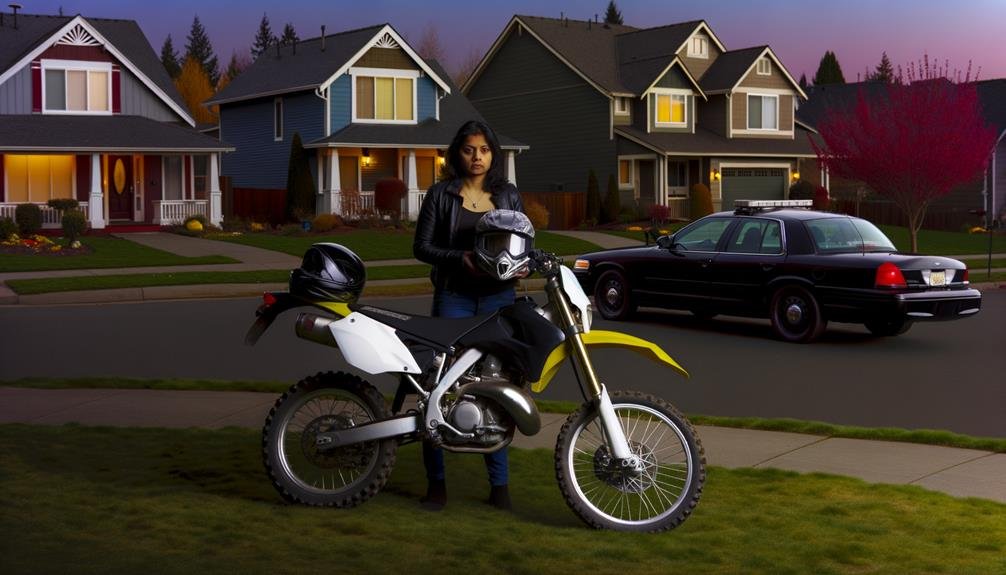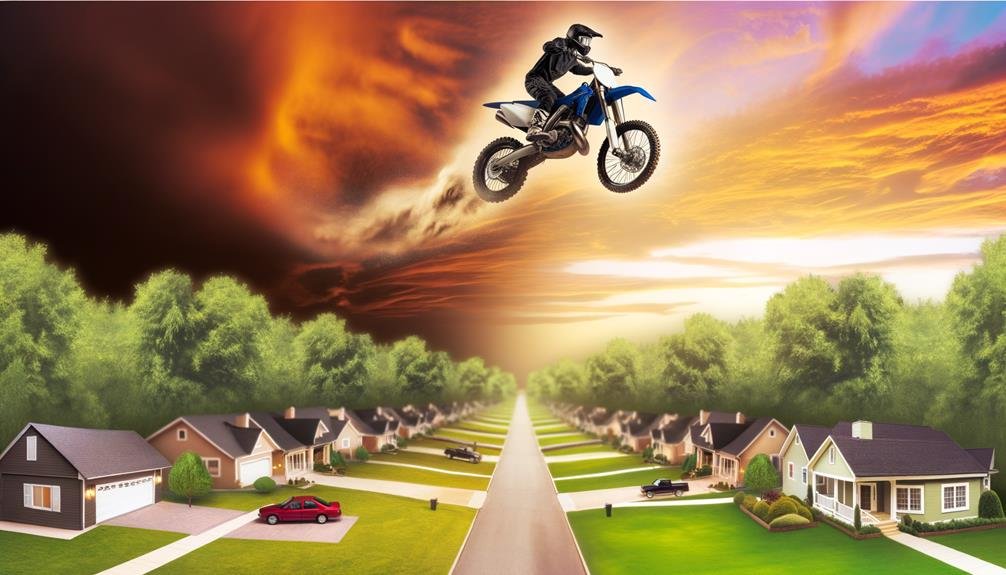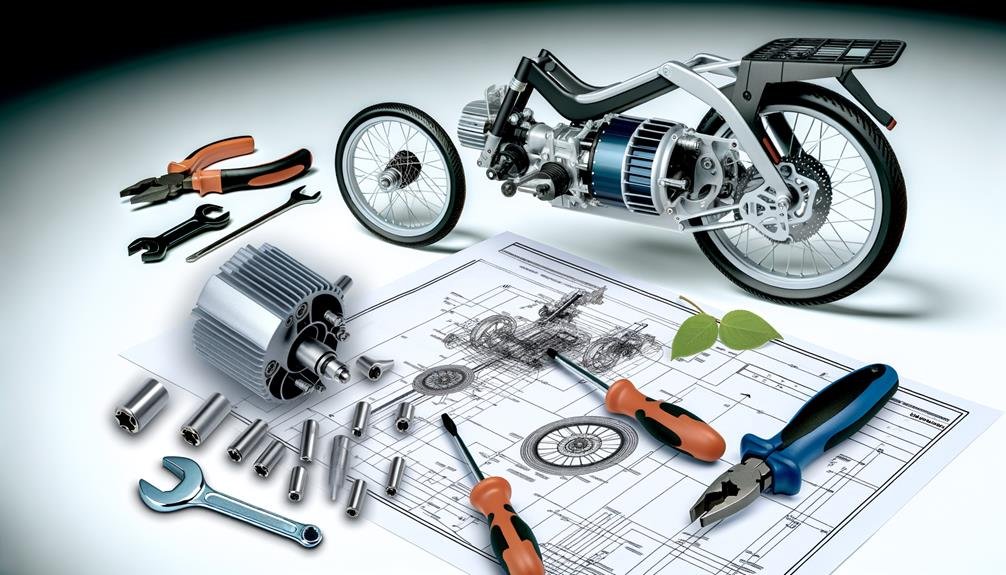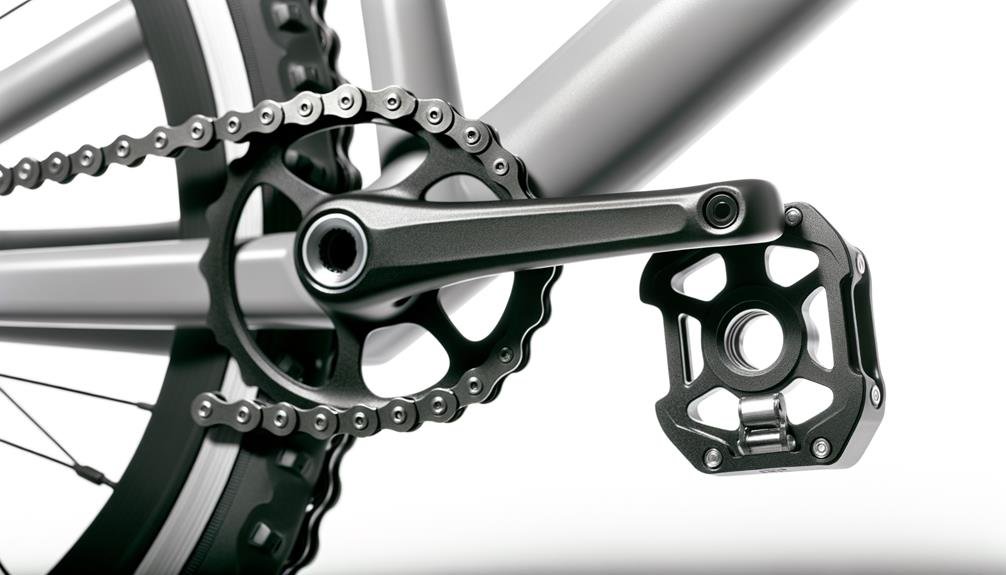Charles Miller is a veteran bike enthusiast with over 12 years of experience dealing with bikes as a mechanic. Despite immense love and expertise for...
As the roar of a dirt bike engine breaks the calm suburban silence, one might wonder: can we legally ride a dirt bike in our neighborhood? It's a question that, while seeming simple, can lead us down a rabbit hole of local laws, noise ordinances, and safety considerations.
We'll explore the nuances of this issue, from state-specific regulations to the potential disruptions to peaceful living. We'll also confront the ultimate question: just because we can, does it mean we should?
Stick around, as there's more to this than meets the eye.
- Key Takeaways
- Understanding Dirt Bike Laws
- Licensing and Dirt Bikes
- Insurance Requirements for Dirt Bikes
- Legal Implications of Dirt Biking
- Dirt Bike Accidents and Liability
- Off-Road Sports With Dirt Bikes
- Street-Legal Dirt Bikes
- Best Places for Dirt Bike Riding
- Making a Dirt Bike Street Legal
- Frequently Asked Questions
- Conclusion
Key Takeaways
- Licensing requirements vary depending on location, with off-road riding not requiring a license but on-road riding does.
- Street-legal dirt bikes need to pass vehicle inspection and adhere to age restrictions and helmet use.
- An Off-Highway Vehicle (OHV) permit, costing $16 and valid for a year, is required for riding on public land.
- Insurance is required for riding dirt bikes on public streets, with rates depending on factors such as safety features, repair cost, and bike value.
Understanding Dirt Bike Laws
Unraveling the maze of dirt bike laws in Texas, we find a mix of licensing requirements, equipment stipulations, insurance needs, age restrictions, and passenger regulations, all of which are crucial for legal on-road and off-road riding. If you're wondering, 'Can I ride my dirt bike in my neighborhood?' the answer may not be as simple as you'd like.
Licensing and permit requirements vary depending on where you plan to ride. For off-road fun, you don't necessarily need a license, but for on-road use, a motorcycle license is a must.
There are also equipment requirements to consider. Street-legal dirt bikes in Texas need to pass vehicle inspection and must be equipped with specific street-legal components.
It's important to note that insurance is required for riding on public streets. Age restrictions also come into play. Generally, kids under 14 can't ride without adult supervision and helmet use is mandatory for all riders under 21.
Passenger regulations also exist. If your dirt bike isn't designed to carry a passenger, don't do it. It's against the law and could result in serious injury.
Understanding these dirt bike laws is the first step to legally ride in your neighborhood.
Licensing and Dirt Bikes
Having established the importance of understanding dirt bike laws, let's now focus on the specifics of licensing and dirt bikes in Texas. If you've ever wondered about the kind of license needed to ride a dirt bike, there are two key permits to consider.
First, dirt biking on public land requires an Off-Highway Vehicle (OHV) permit. This permit:
- Costs $16.
- Is valid from September 1st to August 31st.
- Is essential for all public land riders.
Second, if you plan to ride your dirt bike on public streets, a Class M motorcycle license is mandatory. This can be obtained through either a motorcycle endorsement or a driver's education course.
Lastly, motorcycle insurance is a must for riding on public streets. The rates of this insurance depend on your bike's safety features, repair cost, and its overall value.
Let's remember, we aren't just dirt bike enthusiasts, but responsible riders too. Understanding licensing and dirt bikes is a crucial part of our hobby, allowing us to enjoy the thrill of the ride while respecting the rules of the road.
Insurance Requirements for Dirt Bikes

Let's now turn our attention to the insurance requirements for dirt bikes.
It's important to understand the coverage necessary for these off-road vehicles and the mandatory insurance policies when riding on public streets.
We also need to consider the risks involved if you choose to ride without proper insurance.
Understanding Dirt Bike Coverage
In order to safely and legally ride a dirt bike on public streets, it's essential to have motorcycle insurance. Understanding dirt bike coverage is crucial for anyone who wishes to enjoy this thrilling sport within the confines of their neighborhood.
Here are three key points to remember:
- Rates for dirt bike insurance depend on factors such as vehicle safety features, repair cost, and value.
- Riding without insurance can result in fines, surcharges, and for repeat offenders, potential license revocation or vehicle impounding.
- No insurance is needed for off-road riding, but it's always wise to be protected.
If you're wondering 'Is it Legal To Ride Dirt Bikes in my area?', remember, insurance isn't just a legal requirement, it's peace of mind for you and your loved ones.
Mandatory Insurance Policies
Navigating the labyrinth of mandatory insurance policies for dirt bikes can seem daunting, but it's crucial for anyone planning to ride on public streets. Local laws vary, but typically, if you ride your dirt bike off-road, no insurance is required.
However, switch to public streets, and motorcycle insurance becomes a necessity. Factors such as vehicle safety features, repair costs, and value can affect your rates. Riding without insurance can lead to hefty fines and surcharges. If you're a repeat offender, you risk license revocation or even vehicle impoundment.
Understanding and adhering to these mandatory insurance policies ensures you're legally covered, allowing you to enjoy your dirt bike with peace of mind.
Risks Without Proper Insurance
Without the right insurance, riding a dirt bike on public streets in Texas isn't just risky—it's a violation of the law that could result in severe penalties. The risks without proper insurance are far-reaching and can impact you legally and financially.
Legal Consequences: Riding dirt bikes without proper insurance can result in fines and license revocation. It's a legal requirement in Texas that all motorcycle riders have insurance and a Class M license.
Financial Burden: The cost of fines, potential repair costs, and insurance surcharges can quickly add up.
Increased Premiums: If you're caught without insurance, it could result in higher premiums when you do finally obtain coverage.
Let's keep our community safe and stick to the rules—always ensure your dirt bike is properly insured before hitting the streets.
Legal Implications of Dirt Biking

While it's thrilling to ride dirt bikes in the neighborhood, we must understand the legal implications, including the need for specific permits, licenses, insurance, and adherence to age and safety regulations in Texas. The laws surrounding dirt bike riding are stringent in order to ensure safety and preserve peace in communities.
To ride on public land in Texas, you're required to have an Off-Highway Vehicle (OHV) permit. This costs a modest $16. If you intend to ride on public streets, you'll need a Class M license. This can be obtained through a motorcycle endorsement or a driver's education course.
Insurance requirements differ based on where you're riding. While there's no insurance required for off-road riding, you do need motorcycle insurance for public streets.
As for age limits and safety regulations, Texas laws are accommodating. There's no age limit for off-road riding, but helmet requirements and passenger regulations apply.
Dirt Bike Accidents and Liability
Despite adhering to all the legal requirements, accidents can still happen when riding dirt bikes, bringing into focus the issue of dirt bike accidents and liability. This is a complex area and understanding it's crucial to our sense of belonging in our neighborhood.
If you're involved in an accident due to someone else's negligence, you're entitled to sue for damages. These can include medical expenses, lost wages, and even pain and suffering.
There's always a need to determine who the negligent parties are. They could be other riders, property owners, or even the manufacturers of the dirt bikes. If they're found liable, they may be required to provide financial compensation.
Always report accidents to local police. Besides providing essential documentation for any ensuing legal actions, they can also help enforce safety regulations within the neighborhood.
Off-Road Sports With Dirt Bikes

Navigating the thrill of off-road sports with dirt bikes requires an understanding of the legal requirements, such as permits and licenses, along with keen attention to safety measures, particularly in the state of Texas. As a community seeking the adrenaline rush of dirt biking, it's crucial we consider these factors for a safe and legal ride.
Let's take a look at the basics:
| Requirement | Details | Texas Specifics |
|---|---|---|
| OHV Permit | Required for public land riding | $16 and valid Sept 1st to Aug 31st |
| Class M License | Needed for public street riding | Necessary in Texas |
| Insurance | Required for public street riding | Rates vary based on safety features and bike value |
| Age Limit | Varies | No limit in Texas, but young riders should be supervised |
As we ride our bikes, remember that while the excitement and camaraderie of off-road sports with dirt bikes are unparalleled, compliance with rules and safety measures is paramount. It's not just about the thrill, it's about creating a responsible and welcoming dirt biking culture that respects everyone in our neighborhoods.
Street-Legal Dirt Bikes
We're moving on to the subject of street-legal dirt bikes.
It's important to understand what modifications are necessary to make dirt bikes street-legal and the accompanying regulations.
Let's initiate a discussion on these matters to gain a better grasp of the legalities involved.
Making Dirt Bikes Street-Legal
Kicking off the journey to make your dirt bike street-legal in Texas, it's crucial to ensure it's equipped with the necessary features such as headlights, indicator lights, DOT approved tail lights, brake lights, fuel tank, and tires. This initial step is a huge stride towards making your dirt bike street legal.
To successfully register your bike, you'd need to follow these steps:
- Get the bike inspected at a certified motorcycle shop.
- Purchase motorcycle insurance, with rates varying based on your bike's features, cost of repair, and value.
- Head to the Department of Motor Vehicles for registration.
Regulations for Street-Legal Bikes
Diving into the regulations for street-legal dirt bikes, it's crucial to note that these machines must adhere to specific lighting and safety equipment requirements. This includes headlights, indicator lights, tail lights, brake lights, and DOT-approved fuel tanks and tires.
To ride without violating laws regarding these bikes, acquiring a Class M license is necessary. This can be achieved via a motorcycle endorsement or driver's education course.
These bikes must also undergo a mandatory inspection at a motorcycle shop to meet the necessary safety and street-legal criteria.
Proper registration at the DMV and proof of insurance are essential for legally operating these bikes. Lastly, remember that state-specific insurance regulations apply, and riding without insurance can lead to severe consequences.
Best Places for Dirt Bike Riding

When it comes to dirt bike riding, there are several great locations to choose from. Private property with given permission, off-road riding parks, state trails, and motocross tracks all stand out as the best places to ride. These places offer the freedom and terrain that make dirt bike riding a thrilling experience. They also allow riders to enjoy the sport without worrying about disturbing the peace in a neighborhood.
Let's delve into why these places are so great for dirt bike riding:
- Private Property: If you're lucky enough to have access to private property, it can be a great place to ride. Just ensure that you've got explicit permission from the owner.
- Off-road Riding Parks and State Trails: These are specially designated places to ride, which offer various terrains and difficulty levels. They cater to riders of all skill sets, ensuring that there's something for everyone.
- Motocross Tracks: These provide a controlled environment that's perfect for those seeking a competitive edge or a challenging ride. They often have professionally designed tracks with jumps and obstacles.
Always remember that the "best places" for dirt bike riding are those where you can ride safely and legally. Understanding local laws and regulations is crucial before you hop on your bike. Let's respect the spaces we ride in, ensuring they remain accessible for everyone to enjoy.
Making a Dirt Bike Street Legal
Transitioning a dirt bike for legal street use may seem daunting, but with the right information and guidance, it's an achievable task.
The first step in making a dirt bike street legal is obtaining an Off-Highway Vehicle (OHV) permit, which is valid from September 1st to August 31st. This allows you to ride on public land.
Additionally, a Class M license is needed for street riding. This can be obtained either through a motorcycle endorsement or a driver's education course. It's crucial to remember that a driver's license alone isn't sufficient.
Now, let's turn our attention to the vehicle itself. Ensure your dirt bike is fitted with headlights, indicator lights, DOT approved tail lights, brake lights, and a fuel tank. It should also have street-legal tires.
Next, register your bike at the DMV and provide proof of insurance. The vehicle will have to undergo an inspection at a motorcycle shop to confirm its street legality.
Frequently Asked Questions
Can You Ride a Dirt Bike Around a Neighborhood?
We're often asked if it's permissible to ride dirt bikes around a neighborhood. It depends on local regulations, noise pollution concerns, safety measures, and rider etiquette. Always show respect for others' peace and safety.
Where Can You Legally Ride a Dirt Bike in California?
We're thrilled to guide you on California off-roading adventures. In California, legal requirements permit dirt bike riding on designated OHV areas and trails. Always ensure you've checked local regulations and obtained necessary permissions.
Is It Legal to Ride a Dirtbike on the Sidewalk in Florida?
We're aware that Florida regulations generally prohibit riding dirt bikes on sidewalks due to safety concerns and sidewalk etiquette. It's best to ride in designated areas and always check local laws.
Can You Ride a Dirtbike on the Sidewalk in Texas?
We've found that, generally, it's illegal to ride dirt bikes on sidewalks in Texas. This is due to Texas legislation prioritizing sidewalk safety and pedestrian rights. Always check local ordinances for specific rules.
Conclusion
So, can we ride our dirt bike in the neighborhood?
It's a winding, uphill path to the answer. The laws differ from state to state, and navigating them can feel like battling through a rough and rutted track.
The key is to research, respect local rules, consider insurance, and above all, ride safely.
Let's gear up, rev up our engines, but before we hit the throttle, let's ensure we're not crossing any legal boundaries.

Charles Miller is a veteran bike enthusiast with over 12 years of experience dealing with bikes as a mechanic. Despite immense love and expertise for his Tacoma, he rides his Trek Ebike more. Anytime you meet him, you’ll either hear him talking about Bikes, or writing about all things bikes and cars on this blog.
More Posts


